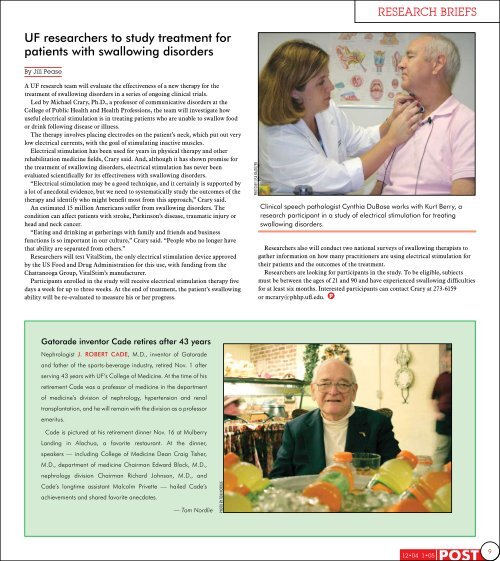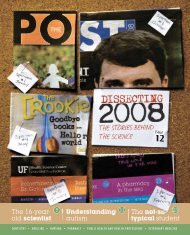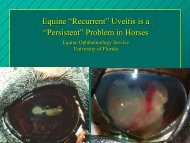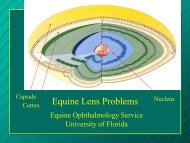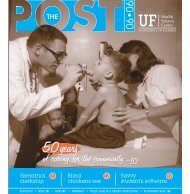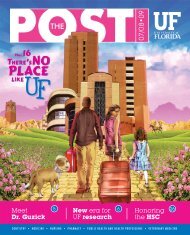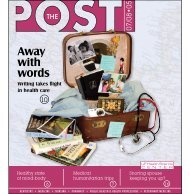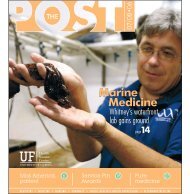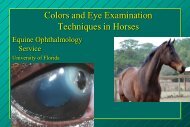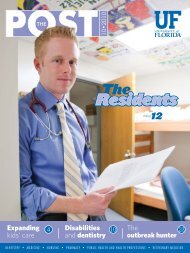Simulation Center - UF Health Podcasts - University of Florida
Simulation Center - UF Health Podcasts - University of Florida
Simulation Center - UF Health Podcasts - University of Florida
You also want an ePaper? Increase the reach of your titles
YUMPU automatically turns print PDFs into web optimized ePapers that Google loves.
Research briefs<br />
<strong>UF</strong> researchers to study treatment for<br />
patients with swallowing disorders<br />
By Jill Pease<br />
A <strong>UF</strong> research team will evaluate the effectiveness <strong>of</strong> a new therapy for the<br />
treatment <strong>of</strong> swallowing disorders in a series <strong>of</strong> ongoing clinical trials.<br />
Led by Michael Crary, Ph.D., a pr<strong>of</strong>essor <strong>of</strong> communicative disorders at the<br />
College <strong>of</strong> Public <strong>Health</strong> and <strong>Health</strong> Pr<strong>of</strong>essions, the team will investigate how<br />
useful electrical stimulation is in treating patients who are unable to swallow food<br />
or drink following disease or illness.<br />
The therapy involves placing electrodes on the patient’s neck, which put out very<br />
low electrical currents, with the goal <strong>of</strong> stimulating inactive muscles.<br />
Electrical stimulation has been used for years in physical therapy and other<br />
rehabilitation medicine fields, Crary said. And, although it has shown promise for<br />
the treatment <strong>of</strong> swallowing disorders, electrical stimulation has never been<br />
evaluated scientifically for its effectiveness with swallowing disorders.<br />
“Electrical stimulation may be a good technique, and it certainly is supported by<br />
a lot <strong>of</strong> anecdotal evidence, but we need to systematically study the outcomes <strong>of</strong> the<br />
therapy and identify who might benefit most from this approach,” Crary said.<br />
An estimated 15 million Americans suffer from swallowing disorders. The<br />
condition can affect patients with stroke, Parkinson’s disease, traumatic injury or<br />
head and neck cancer.<br />
“Eating and drinking at gatherings with family and friends and business<br />
functions is so important in our culture,” Crary said. “People who no longer have<br />
that ability are separated from others.”<br />
Researchers will test VitalStim, the only electrical stimulation device approved<br />
by the US Food and Drug Administration for this use, with funding from the<br />
Chattanooga Group, VitalStim’s manufacturer.<br />
Participants enrolled in the study will receive electrical stimulation therapy five<br />
days a week for up to three weeks. At the end <strong>of</strong> treatment, the patient’s swallowing<br />
ability will be re-evaluated to measure his or her progress.<br />
Photo By lisa baltozer<br />
Clinical speech pathologist Cynthia DuBose works with Kurt Berry, a<br />
research participant in a study <strong>of</strong> electrical stimulation for treating<br />
swallowing disorders.<br />
Researchers also will conduct two national surveys <strong>of</strong> swallowing therapists to<br />
gather information on how many practitioners are using electrical stimulation for<br />
their patients and the outcomes <strong>of</strong> the treatment.<br />
Researchers are looking for participants in the study. To be eligible, subjects<br />
must be between the ages <strong>of</strong> 21 and 90 and have experienced swallowing difficulties<br />
for at least six months. Interested participants can contact Crary at 273-6159<br />
or mcrary@phhp.ufl.edu. P<br />
Gatorade inventor Cade retires after 43 years<br />
Nephrologist J. Robert Cade, M.D., inventor <strong>of</strong> Gatorade<br />
and father <strong>of</strong> the sports-beverage industry, retired Nov. 1 after<br />
serving 43 years with <strong>UF</strong>’s College <strong>of</strong> Medicine. At the time <strong>of</strong> his<br />
retirement Cade was a pr<strong>of</strong>essor <strong>of</strong> medicine in the department<br />
<strong>of</strong> medicine’s division <strong>of</strong> nephrology, hypertension and renal<br />
transplantation, and he will remain with the division as a pr<strong>of</strong>essor<br />
emeritus.<br />
Cade is pictured at his retirement dinner Nov. 16 at Mulberry<br />
Landing in Alachua, a favorite restaurant. At the dinner,<br />
speakers — including College <strong>of</strong> Medicine Dean Craig Tisher,<br />
M.D., department <strong>of</strong> medicine Chairman Edward Block, M.D.,<br />
nephrology division Chairman Richard Johnson, M.D., and<br />
Cade’s longtime assistant Malcolm Privette — hailed Cade’s<br />
achievements and shared favorite anecdotes.<br />
— Tom Nordlie<br />
Photo By tom nordlie<br />
12•04 1•05<br />
POST


